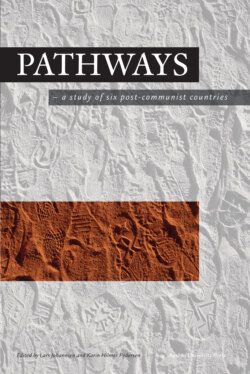Читать книгу Pathways - Группа авторов - Страница 4
На сайте Литреса книга снята с продажи.
Preface
ОглавлениеThe working title of this volume was: Comparing the incomparable, and as such this book has made a long journey. In keeping with the Tocquevillian tradition, Professor Ole Nørgaard initiated a research series under the heading ‘Understanding Politics in X-country’. The authors were asked to write articles containing fundamental insights into the logic of the current workings of the polity of a country of which they had comprehensive knowledge. Moreover, and again following the Tocquevillian tradition, the articles were to be written in the light of each country’s uniqueness compared to other countries in the region, and in particular to the country of a West European reader. The result was a series of 15 country research papers published at the Department of Political Science, Aarhus University.
Regrettably, this volume had to be compiled without Ole Nørgaard. Shortly before his death he envisioned a volume that was to combine methodological boldness with solid unique analysis. Ole was fond of saying that ‘good research has a success rate of 50 per cent’. A good researcher should venture into uncharted waters; otherwise we would be doomed to repeat the mistakes of those who came before us. To honour his memory we took this task upon ourselves.
From the original 15 country studies we chose six countries, each of which contains a key feature decisive for the initial institutional choices that frame the capability or incapability of governments to produce policies – and thus to stabilise the political system as such. We thereby refrain from looking only at the process of democratisation and democratic consolidation. Instead we look at stabilising and de-stabilising features in democratic as well as authoritarian regimes.
The initial institutional choices are based upon the elite preferences engendered by the different impacts of the quadruple transition process in which nation building and state building intertwine with marketisation and political regime change. Moreover, we look at how the international context enhances or constrains elite preferences within these four interconnected transformations.
Comparing the incomparable was part of a larger project investigating Democracy, the State and Administrative Reform in former communist countries. We want to thank the Danish Social Science Research Council and the University of Aarhus Research Foundation for their generous financial support. We also want to thank Else Løvdal for her attempts to mend our linguistic incapacities and for all her good humour and support throughout the lifetime of this project.
With this volume we and the authors wish to express our special thanks to Ole Nørgaard, but alas this has to be done in memoriam. He was a driving force behind this and many other projects. His kindness, support, foresight and friendship will be most fondly remembered.
January 2009
Lars Johannsen & Karin Hilmer Pedersen
